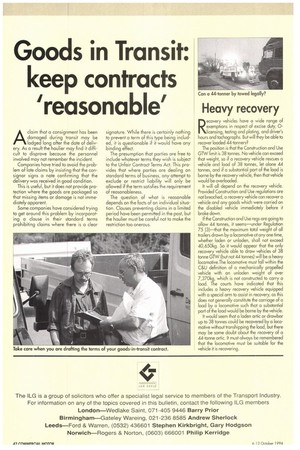Goods in Transit.
Page 46

If you've noticed an error in this article please click here to report it so we can fix it.
keep contracts 'reasonable'
Aclaim that a consignment has been damaged during transit may be lodged long after the date of delivery. As a result the haulier may find it difficult to disprove because the personnel involved may not remember the incident.
Companies have tried to avoid the problem of late claims by insisting that the consignor signs a note confirming that the delivery was received in good condition.
This is useful, but it does not provide protection where the goods are packaged so that missing items or damage is not immediately apparent.
Some companies have considered trying to get around this problem by incorporating a clause in their standard terms prohibiting claims where there is a clear
signature. While there is certainly nothing to prevent a term of this type being included, it is questionable if it would have any binding effect. The presumption that parties are free to include whatever terms they wish is subject to the Unfair Contract Terms Act, This provides that where parties are dealing on standard terms of business, any attempt to exclude or restrict liability will only be allowed if the term satisfies the requirement of reasonableness.
The question of what is reasonable depends on the facts of an individual situation. Clauses preventing claims in a limited period have been permitted in the past, but the haulier must be careful not to make the restriction too onerous.




























































































